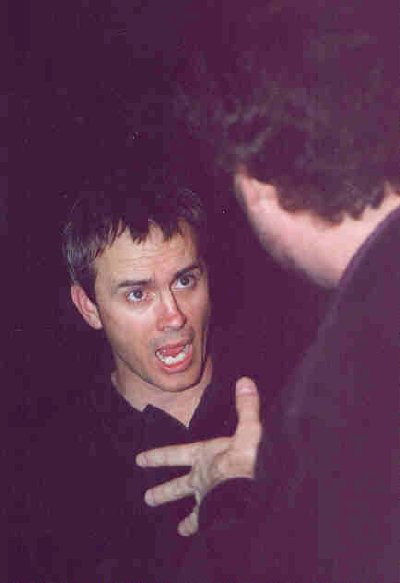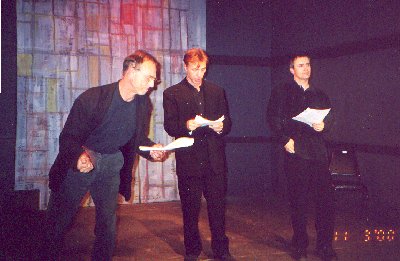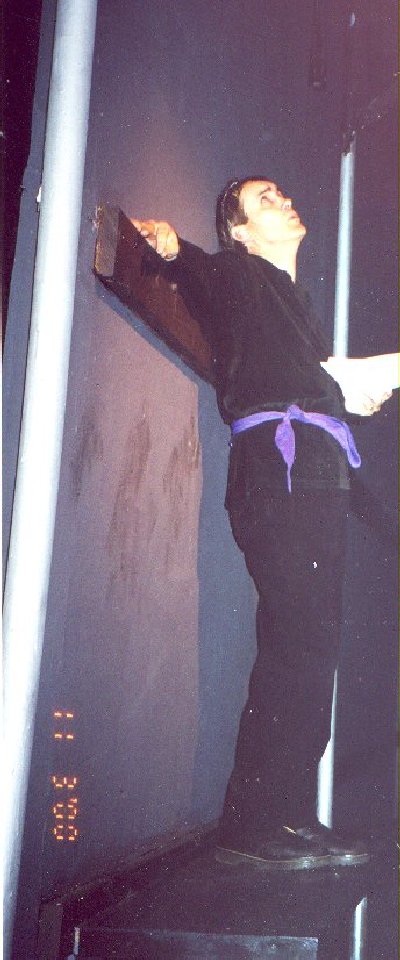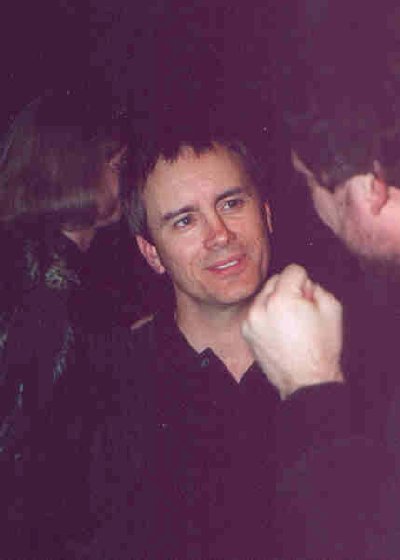
- Marc Alaimo, Casey Biggs, Jeffrey Combs - |
CRUISE2000
REPORT
- The Perfomances - by Carol Duffy
|

- Marc Alaimo, Casey Biggs, Jeffrey Combs - |
CRUISE2000
REPORT
- The Perfomances - by Carol Duffy
|
|
What Jeffrey, Casey and Marc Left Behind subtitle: "Brush Up Your Shakespeare" (with apologies to Cole Porter) Act One: ("To go, or not to go, that is the question")
In the end, we went. It was a close thing. Yes, I'll admit it, even for a real theater fan it's a long flight from New York to LAX. It's complicated to deal with work obligations, particularly with two schedules to juggle. It's hard to leave the girls (thank heaven for grandmothers). But when presented with the opportunity to see three of our favorite actors on stage -- actors who rarely, if ever, venture back East -- we started idly checking our frequent flyer miles. When we heard that they were performing selected scenes from Shakespeare, providing the opportunity to see them in a wide range of roles in the course of a single evening, we began wondering if maybe we could re-arrange our work schedules after all (how busy can the beginning of November really be?) Add a cruise in support of two charities, at a time of
the year when New York is not exactly balmy (although neither was the cruise
weather, but that's another story), a chance to see a second onboard performance,
and the fact a grandmother is, indeed, available to babysit, and the entire
prospect proved irresistible. So we ventured. And we are very glad we did.
|

- Jeffrey and a fan - |
Act Two:
("I did enact Julius Caesar. I was killed i' the' Capitol: Brutus killed me.") ("Be the players ready?") The players were certainly ready. And they did enact Julius Ceasar (in part). On a bare stage in Venice, California, Jeffrey, Casey and Marc performed scenes from Shakespeare's writings in a production entitled "What Shakespeare Left Behind". It was quite a night. Great theater. Great fun. Shakespeare provides a vehicle to explore not only the
kinds of stories people tell each other, but also how we tell those stories.
Over the course of the evening we were presented with scenes from the tragedies,
the comedies, the histories, and even a sonnet or two. We saw lovers (yes,
indeed), heros, villains, servants, masters, twins, Puck, a corpse, and
a stuffed dog. We heard orations, dialogue, soliloquies (or were they monologues?)
prose, poetry.
|
These excerpts were doubtless carefully chosen by Jeffrey, Casey and Marc to provide a glimpse into a wide range of Shakespeare's work, and its continued relevance to a contemporary audience. This format had an added benefit: it gave us the opportunity to see many facets of their considerable talent in one production; a chance that I, at least, would certainly never have had in New York. (While I certainly enjoy well made movies, I have a decided and definite prejudice for live theater). The ease with which each switched from character to character, genre to genre was truly wonderful to watch, as was their unfailing ability to convey the essence of each scene without the context of the play from which it had been taken. And Jeffrey, Casey and Marc did so with no scenery, minimal staging and only a handful of props (a glittering headband and a stuffed dog each made a cameo appearance). They used nothing but the material and their own versatility and skill to draw us in, and draw us in they did. I didn't see a program, so what follows is strictly from memory . I believe the scenes they chose were, by no means in order, as follows (since this is coming from someone who after three days on the ship still couldn't find the Lido deck with certainty, I apologize in advance if I've forgotten something): from Romeo and Juliet, Jeffrey performed Mercutio's speech given while hunting for Romeo (gone over the orchard wall to find Juliet) ("Romeo! humors! madman! passion! lover!"). He noted that, from Mercutio's point of view, the speech was about loss: the loss of the relationship he had previously shared with Romeo (author's note: perhaps foreshadowing Mercutio's later loss of his life ?). Jeffrey and Casey also brought us the balcony scene as Juliet and Romeo respectively (about which more later). |
 |
 |
From Henry V, Casey recited the Prologue's speech "O for a Muse of fire" (although from his initial description of what was coming, I half expected to hear Henry's Saint Crispian's Day speech). He touched on the difference between Branagh's film version and that of Olivier, and the real world context in which each was made that may have lead to those differences. Marc and Casey were (respectively) Brutus and Marc Antony, giving their funeral orations from Julius Ceasar (with Jeffrey in the role of the decorous corpse in a maroon velvet drape, the color of blood, and the audience as the fickle Roman populace). We saw villains: Jeffrey and Marc gave us the scene from Othello where Cassio (Jeffrey) bemoans the loss of his reputation and Iago (Marc) first uses that distress to set in motion his plot to destroy Othello and then lets the audience in on what, precisely, he's up to. We also saw comedies; two scenes from Shakespeare's plays about twins and mistaken identities. Marc became Malvolio from Twelfth Night, where he comes upon a letter that he believes to have been written by Olivia hinting at her love for him, but which was actually written by others as a practical joke. Jeffrey and Casey performed a scene from The Comedy of Errors with Jeffrey as one of the besieged Dromio twins and Casey as one of the Antipholus twins ("What claim lays she to thee? " "Marry, sir, such claim as you would lay to your horse..."). Marc chose Hamlet's speech to the players ( "Speak the speech, I pray you, as I pronounced it to you..."). He also put the stuffed dog to good use as Launce from Two Gentlemen of Verona ("O 'tis a foul thing when a cur cannot keep himself in all companies!") I believe he also did something from Titus Andronicus, but here memory fails utterly. And Jeffrey crouched on a footstool with only his face and hands in the light as he delivered Puck’s speech from Act lll scene 2 of A Midsummer Night’s Dream ("My mistress with a monster is in love."). Casey gave us Sonnet 116 ("Let me not to the marriage
of true minds admit impediments"), Jeffrey the seven ages of man. And all
three ended with an original piece demonstrating how so much of Shakespeare
has made its way into everyday speech.
|
Speaking of having nothing but the material and one's own skill upon which to rely, I have to mention my personal favorites of the evening. First: the balcony scene. For me, that moment demonstrated most forcefully the magic that live theater can evoke in the right hands. While men playing female roles may have a fine, historic tradition behind it, it's still not a casting decision seen frequently in mainstream theater today. Jeffrey and Casey took a big risk, and a brave one. At first we all chuckled when Jeffrey vaulted onto the "balcony" (a moment that few of us, I suspect, will ever forget; did I mention that glittering headband?). Granted, they were playing to a friendly audience, but the risk that we wouldn't stop laughing was still there. Yet Jeffrey and Casey conjured Juliet and Romeo out of two men, a bare stage, the lines, and their own talent. They committed, and that commitment brought the audience along with them. My other favorite: Puck’s speech. Magic. The image of
Puck, ringed in light, will always remain with me.
|
 |
Onboard, Jeffrey, Casey and Marc decided to try something a little different. Rather than a second run-through of the same show, to our great good luck they provided a seminar on Shakespeare's art and the craft of performance. More particularly, Jeffrey, Casey and Marc used the same scenes from the earlier evening to illustrate tools that can be used when approaching one of his works, whether from the point of view of the reader, the audience, or the performer. They gave us some background information to put the scenes in context. They provided insight into the process that helps shape and inform their own performances. It was an unparalleled chance to learn from people whose work we admire. In a word, we got our own master class. First and foremost, all three emphasized through particular examples how an actor is the servant of the text he is performing, and how keeping the line of that text and its rhythm helps convey its meaning, particularly when dealing with somewhat archaic language. In speaking about this use of rhythm as an aid to meaning, and to performance, Jeffrey pointed out that, on occasion, Shakespeare used two characters to, in essence, speak one line. |
 |
One example he gave was from the
balcony scene:
Romeo: What shall I swear by? Juliet: Do not swear at all. (the two lines, when combined, forming one line in iambic pentameter). He also noted the initial disconnect between the two after Romeo made his presence known: Juliet, in the same scene, questioning Romeo repeatedly about how he got there, why he was there, and what, precisely, brought him to her orchard. Casey demonstrated how Shakespeare used some of his speeches to help set the scene of the play to follow, or to sum up the events that had transpired. By way of example, Casey mentioned the opening speech from Henry V as an example of bringing the audience to the point of the upcoming action, and Jeffrey explained how Puck's speech was used to bring A Midsummer Night's Dream to a close. Another point made was how Shakespeare used alliteration
to evoke the scene he was describing (one of the examples Casey used was
the line "printing their proud hoofs i' the receiving earth" evoking the
sound of horses). We also learned that Shakespeare often signaled a shift
in mood by a switch in language from prose to poetry, and how listening
for that switch can help an audience follow where Shakespeare is heading
next.
|
They went through some lines with particularly elusive literary, mythological or contemporary references, and explained how at the time, the audiences would have had the meanings at their fingertips (e.g., Casey mentioning that the "wooden O" referred to in the opening speech from Henry V was the Globe Theater). Shakespeare's use of opposites to make a particular point was also mentioned (e.g. "Weary with toil I haste me to my bed"; "And not impute this yielding to light love which the dark night hath so discovered"). And it will probably be a long time before I can hear Iago's line "And, good lieutenant, I think you think I love you" with a perfectly straight face. The process taught me things I never knew, gave me insight into scenes I thought I knew, and added another dimension to the original performances themselves. And it was great fun. The performance coupled with the seminar was a total treat. I must say in all honesty, however, that I would not ace the midterm. For while I now know the difference between a monologue and a soliloquy, I still don't quite have straight which one is which. Gentlemen? |
 |
Act Three
A Musical Interlude ("If music be the food of love, play on") On Sunday, Casey performed what he described as his favorite sappy love songs. While they may be his favorites, they were far from sappy. With his acoustic guitar, he sang a range of songs from Sondheim, to Johnny Mercer, to James Taylor (with a running commentary about where he had heard them, why they spoke to him, etc.). I'll leave it to someone else to describe his performance in greater depth. Suffice it to say, Casey has a lovely voice, seamless transitions, and excellent taste. His choices were varied and invariably interesting. He said that someday he might record the songs. I hope that he does. |
| Act
Four
(" So good night unto you all...") So we ventured. What did we gain? A great deal. I'm the richer for it in many ways. In addition to great good fun and delightful company, I learned things I had never considered about plays I thought I knew well. I had the opportunity to watch, listen to and learn from Jeffrey, Casey and Marc. Terrific actors; terrific people. Thank you, gentlemen, one and all, for the generosity and commitment of time, talent, and knowledge that went into this endeavor. I won't forget it. And if you ever get the chance, please come to Broadway; the theater is a poorer place when you're not in it. |